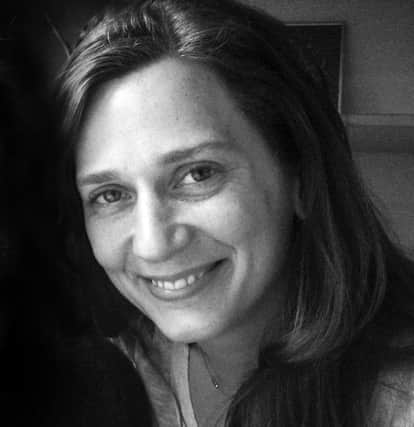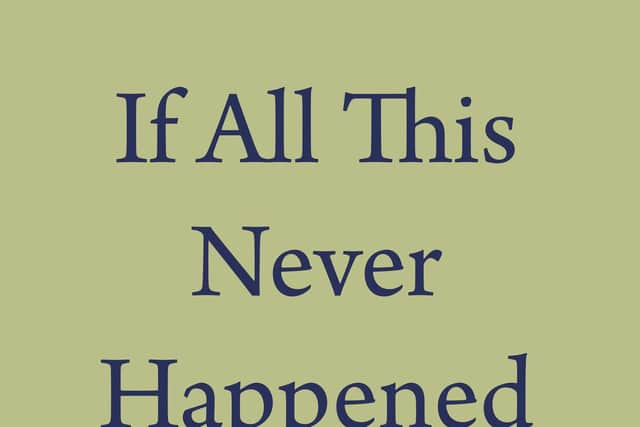Book Club: Autobiographical poems that narrative around a working-class childhood and dysfunctional family life


If All This Never Happened won the Munster Literature Centre's Fool for Poetry Chapbook Competition 2021 and was shortlisted in the Saboteur Awards for Best Poetry Pamphlet 21/22. Vicky is the founder of Hive South Yorkshire which supports and develops young writers, and in 2019 received a Sarah Nulty Award for her work for young people.
The poems in If All This Never Happened span everything from autobiographical narratives around a working-class childhood and dysfunctional family life, to exploring the neurodivergent brain, and themes of illness and predatory and antisocial behaviours.
Advertisement
Hide AdAdvertisement
Hide AdIan McMillan said of the collection: “This is poetry working with great compassion and skill to light up whatever the world throws at it. Vicky Morris's work is a heartening and humbling illumination of Hemingway's phrase 'grace under pressure'. Here, the pressure is great, but the grace is greater.”


Vicky Morris’s poetry has also appeared in poetry magazines like The Rialto, Magma, Poetry Wales and The North. She has been placed in various competitions including winning the Aurora Prize for Poetry 2020, and the Prole Laurate Competition in 2019.
The full collection is available at: https://munsterlit.ie/bookshop/if-all-this-never-happened/
Lesley
i.m Lesley Ann Downey 1954-1964
Sometimes I tell the story of my namesake,
of how my mother (when she was Nurse Margaret)
met a young policeman in the hospital staff room
raw from listening to the evidence at Chester Assizes;
the 16-minute tape they’d had to sit through, found
in an old suitcase, station lost property, its ticket
in the spine of a prayer book. How he sat and wept
in his dark uniform, and she made him sugary tea.
How I was named for Lesley, for her ten short years,
for her joy at the Ancoats Boxing Day Fair, for her
wide-eyed trust of the world, her tartan frock, pink cardie
and red shoes, for how she called to God for Mummy.
And I picture my mother sat there listening,
her hand on his hand, the other on her belly, me not yet
kicking. She said she wanted to bring her back,
she wanted to bring her home.
Sea Road
(Summer of ‘85)
Remember the night you and Lorn walked back this way,
past the jangling cluster of amusement arcades, the bingo caller’s
Advertisement
Hide AdAdvertisement
Hide Admuffled boom on the mic, the slot-machine beeps and flashing lights,
then the long quiet stretch of Sea Road. Remember the man
who stopped his car, not once but twice, pretended to fiddle
behind a torch-lit bonnet, and you saw his open fly,
his hand offering up his cock like a fairground prize
to two young girls in beach dresses. Lorn still chattering,
heedless of the whisper in your ten-year-old throat,
and you daren’t look back or turn off the road.
Then up ahead, you see a shape in the dark, that same car
waiting, bonnet raised, headlights off, engine ticking,
the dim glow of torchlight. But this time, he’s upped
his game. And now you are running, Lorn pulling you
down this long, empty road, running like the dark
is closing in behind you, like it’s stroking the backs
of your legs, running from the edge of something sharp
and faceless, until you burst into the hall, gasping, out of breath.
Mum shouting – What, what is it!?
Both of you mute, moving along a road somewhere,
the dark of a car boot, your mouths gagged shut.
German Train
I wish my mind was like this German train,
with its neat fold-up storage, deep luggage racks,
easy-reach wall hooks. Plenty of leg room.
Each seat with its own plug socket,
little boxes attached for all the rubbish.
And wide aisleways, no waiting to pass
the food trolley. A separate dining carriage
for pancakes and coffee. Blinds you can pull down
to mute the sun. A screen charting where you’re going
and all the places you’ve come from.
I wish my mind was this German train; efficient,
orderly, running on time. And all these thoughts
traveling to who knows where –
chattering-eating-sleeping, quietly crying
or lingering at the window, lost in the face staring back.
Lounge
The nurse says they should’ve given me a line-in
the first time, straight to my heart.
Now the veins in my arm grow hard.
FEC chemo is the worst, she says.
We’ll sort it for next time. Then you won’t have me
here again. She smiles, meaning
there’ll be no more need to check
if FEC is leaking into tissue. I busy myself,
in the bubble of my pastel recliner,
move through settings for legs and back,
look out across the bow of this sterile ship,
thankful it looks so effortless, on course,
most scroll phones, heated pillows
propping up wrists, loved ones sat crooked
on hard chairs. All of us watched over
by the daytime TV personalities smiling
their synchronised blessings from three screens,
and the tea trolley keeps on doing the rounds.
This could be some starship old people’s home,
where we’ve paid good money to be drip-fed youth,
but most of us are too young to look the part.
I forget where we are when a little boy
from another ward whizzes in
with a bald head and aeroplane arms.